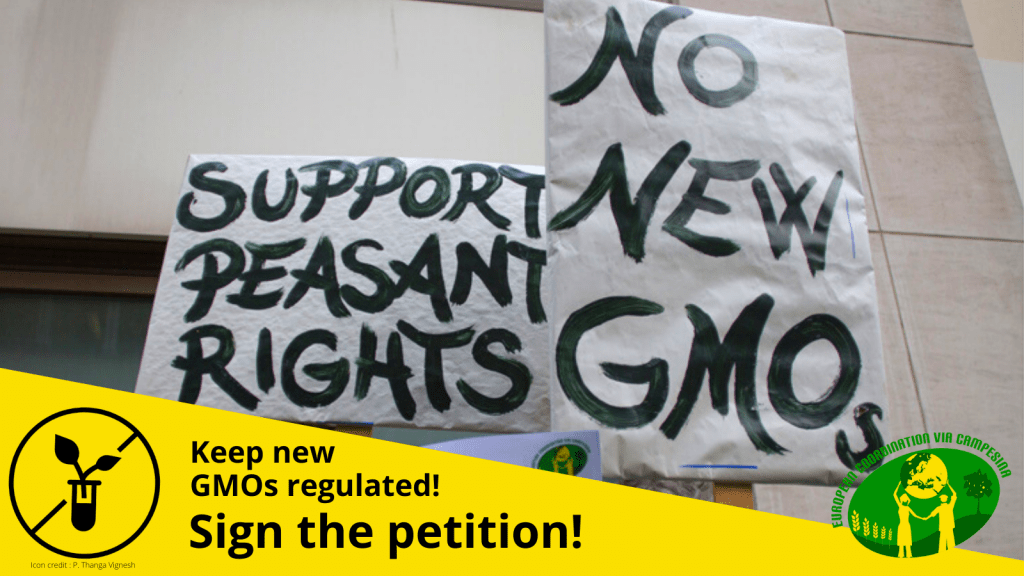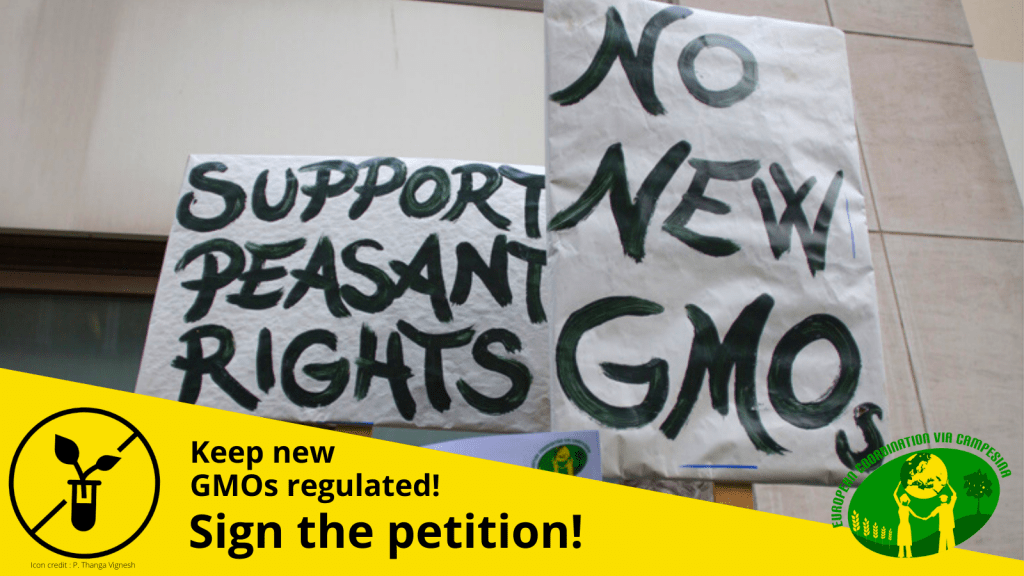Europe : Less than one month left to keep new GM food strictly regulated and labelled

(Brussels, October 19, 2022) Genetically modified organisms (GMOs) are a threat to peasant agriculture. All techniques of genetic modification of plants are covered by patents, reinforcing the control of seeds by the few multinationals that dominate this market, destroying the autonomy and rights of farmers to seeds.
Although presented by the multinationals that produce them as the miracle solution to climate change and the end of pesticides, GMO plants are actually a pure product of industrial agriculture and an environmental disaster: plants are standardised for the world market, not at all adapted to local growing conditions, growing in monocultures and requiring a lot of chemical inputs to survive. In short, GMOs are absolutely incompatible with the peasant agroecology model that ECVC defends as a solution to the current environmental and climate challenges. Peasants have never needed GMOs to feed the planet, it is a false solution only intended to enrich a few multinationals!
In the EU, a strict legislation has been in place since 2001 to regulate GMOs, thanks to the mobilisation of farmers, environmentalists and citizens, the vast majority of whom are opposed to these techniques. But under pressure from the lobbies, the European Commission is currently making proposals to deregulate certain new techniques of genetic modification, in defiance of the right of farmers and peasants to choose a GMO-free agriculture and food. Let’s mobilise against this threat to peasants’ rights and food sovereignty: sign the petition!
Keep New GM-Food strictly regulated and labelled!
Big chemical and seed corporations want to push new genetically modified organisms (GMOs) onto the market, forcing genetically modified food onto our fields and plates without us knowing about it. These companies have been lobbying the European Commission for years to exclude new GMOs from the European GMO regulation, making unsubstantiated claims on the supposed benefits for sustainability, pesticide reduction and climate. But as they also hold patents on the seeds engineered with these techniques, their true motivation remains to increase their profits. Such an industry takeover of seeds would seriously threaten farmers’ seed autonomy and agricultural biodiversity as a whole. Now the European Commission plans to exclude new GMOs, which they call new genomic techniques (NGTs), from the approval processes of the existing EU GMO legislation. Under the current rules, old and new GMOs are subjected to EU authorisation, which ensures risk assessment for human health and the environment, transparency for producers and farmers, and clear labelling for consumers. Excluding new GMOs would prevent farmers, food producers, retailers, and citizens from opting for GM-free choices. We have the right to decide what we eat and grow in our fields!
- New GMOs are GMOs and should be regulated as such, in line with the precautionary principle. All GMOs must undergo a strict safety evaluation and be labelled as genetically modified, to ensure transparency throughout the whole supply chain for citizens and farmers.
- More research must be carried out on the environmental, biodiversity and health risks of new GMOs, on their socio-economic impacts for farmers and the food system, and on the development of detection methods.
- National and EU decision makers need to promote and support proven solutions for a sustainable and climate-resilient agriculture, such as agroecological practices and organic farming, and to protect the freedom of breeders to operate without being restricted by the far-reaching scope of patents on seeds produced with new GMOs.
We urge national and European decision-makers to take a strong stand against any attempts to exclude new GMOs from the existing EU GMO legislation and to uphold mandatory safety checks, transparency and labelling for all GMOs to guarantee the safety of our food, as well as to protect nature, the environment and our freedom of choice. Who is behind this petition?
A coalition of more than 40 peasants’ and environmental organisations in 15 EU countries is managing and supporting this petition. On this page, the petition counter shows the total number of signatures collected by our different partner organisations. You can sign and share the petition at least until July 2022.

